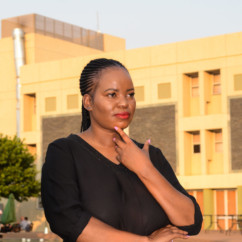Mavis Nduchwa
2020 Fellow
Founder, Kalahari Honey

Mavis Nduchwa is the CEO of Kalahari Honey, a social enterprise in Botswana whose mission is to fight hunger and poverty as well as build sustainable communities. Founded in 2015 Kalahari Honey uses beekeeping as a tool to mitigate human and wildlife (elephant) conflict by training and supplying rural farmers with beehives.
Botswana is home to the world’s largest elephant population, every year farmers lose their lives and their crops due to elephants. Kalahari Honey works to solve the problem of human-wildlife conflict by using beehives as living fences to keep elephants away from farms. These living fences prevent damage by elephants, which means that farmers no longer have to shoot any that come near their farms.
Kalahari Honey trains and supplies farmers with beehives, and then buy back the honey from them. This business creates employment and income for farmers, contributes to better yields for farmers as crops are not destroyed by elephants, and contributes to gender equality and women’s empowerment. Kalahari Honey processes, packages, and supplies to the market, both local and international with desert raw honey and mead (honey wine). They currently have a network of more than 500 women farmers and counting.
Prior to transitioning to agriculture, Mavis worked in various safari camps and hotels in the hospitality sector including the world-renowned award winning Mombo Camp in the Okavango Delta Botswana. With over 15 years’ experience in the hospitality industry and agriculture, Mavis’s focus is now on “organic symbiosis” and building sustainable communities.
Mavis Nduchwa is the recipient of the Woman Owned Business Of the Year 2019 Botswana (Grant Thornton), Most Outstanding African Entrepreneur Award 2018 (Tony Elumelu Foundation), Botswana Innovation Award 2019 (Desert Honey Wine), Lioness Of Africa 2015, BBC Food Chain Judge- 2019, Young African Leaders Initiative (YALI) 2016, Top 100 Meaningful Businesses 2020.
Sustainable Development Goals 2 (Zero Hunger), 5 (Gender Equality), and 11 (Sustainable Cities and Communities)